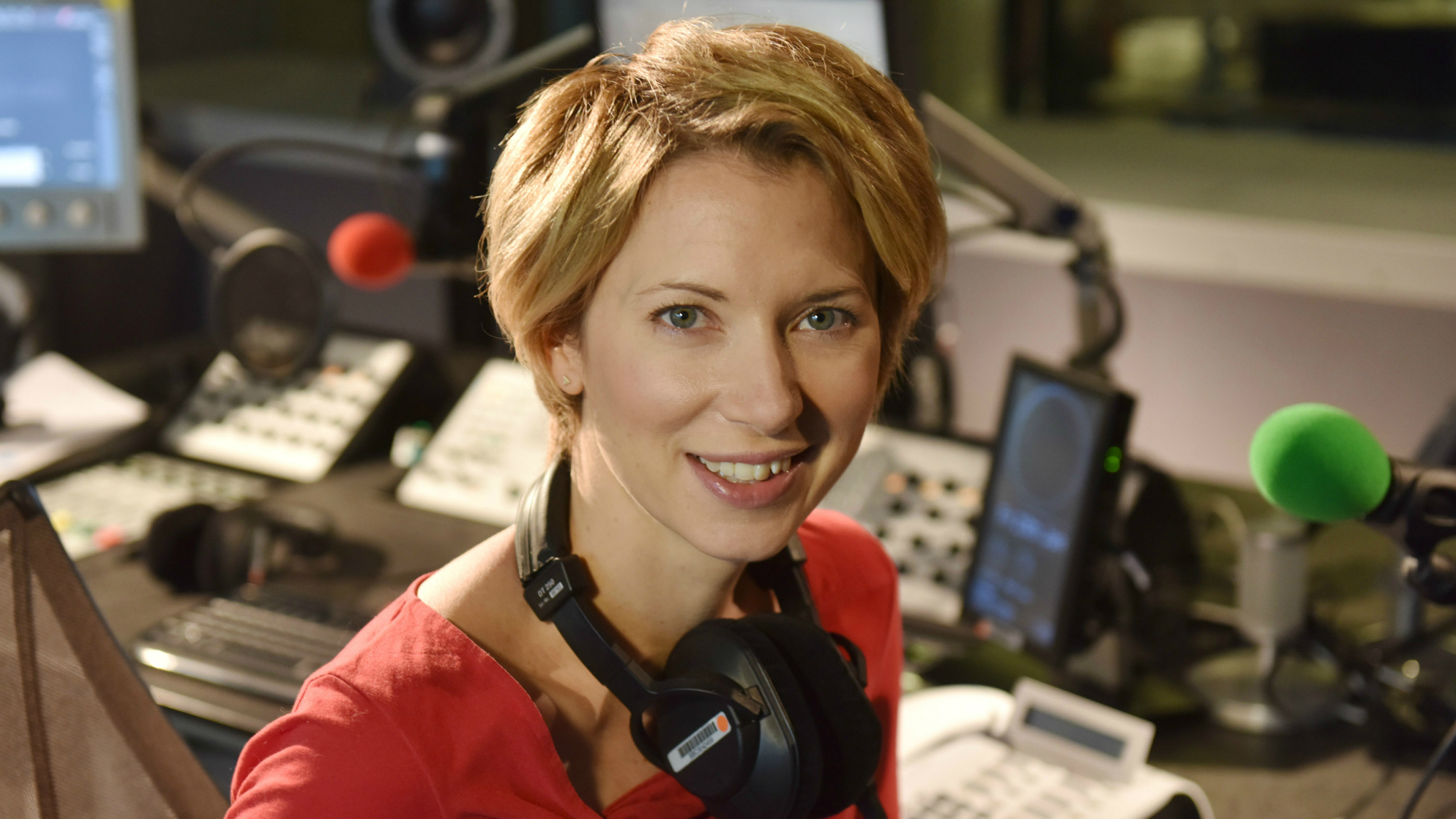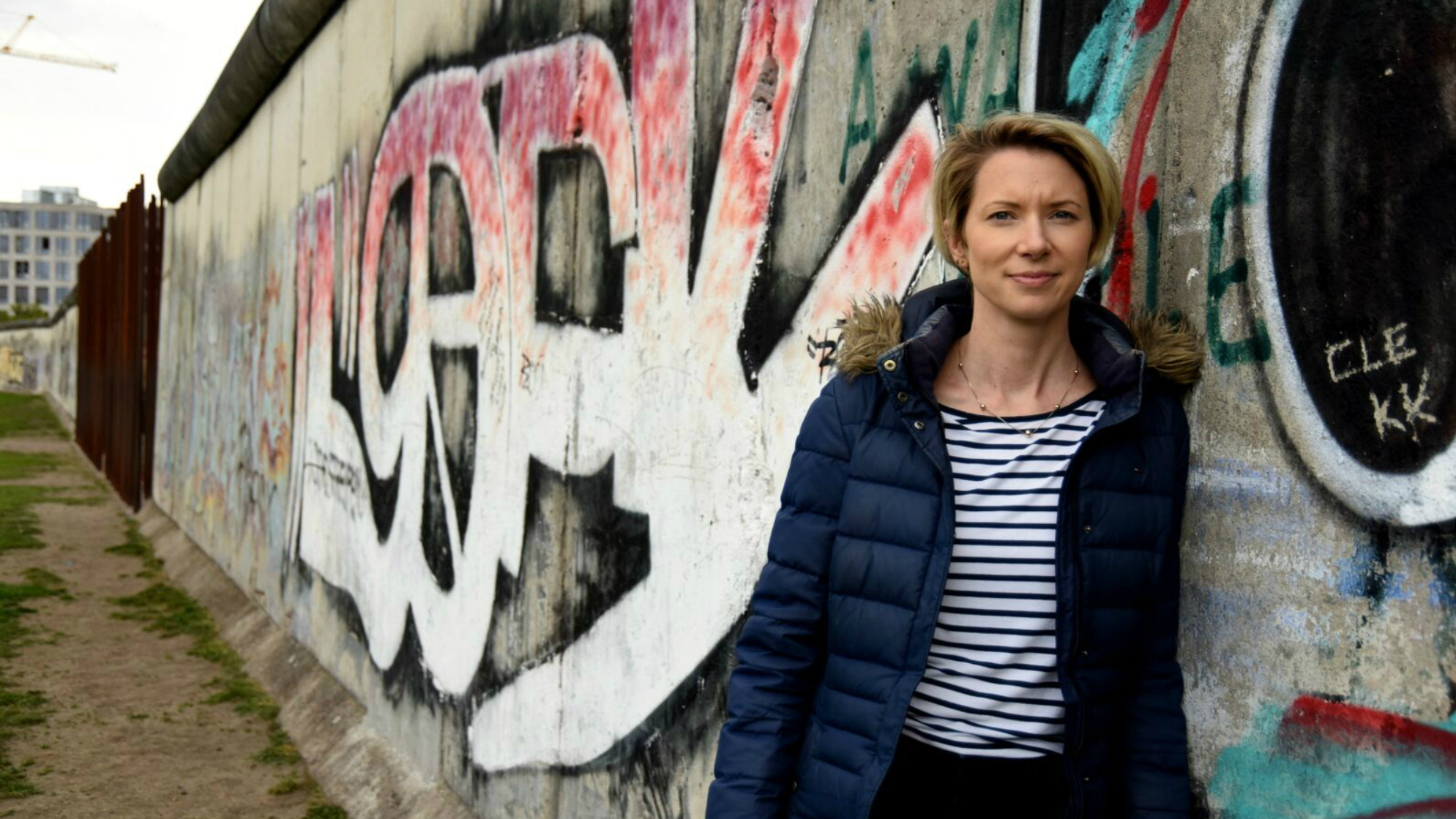'A genetic condition is making me lose my hearing, but I won't let it affect my career'
Helena Merriman, an award-winning BBC Radio 4 presenter/producer and mum of two, reveals how she’s overcoming a shock diagnosis


Celebrity news, beauty, fashion advice, and fascinating features, delivered straight to your inbox!
You are now subscribed
Your newsletter sign-up was successful
Helena Merriman, an award-winning BBC Radio 4 presenter/producer and mum of two, reveals how she’s overcoming a shock diagnosis
It’s four in the morning. I’m lying in bed and something feels wrong. My husband isn’t there. Then I hear something over the baby monitor and realise he’s upstairs with our four-month old. I’m confused. Why didn’t I hear him crying? Like most mums, it’s usually me who hears him first. That was the moment I knew something wasn’t right.
A few months later, after a GP referral, I was sitting in a senior audiologist’s sound-proof booth. I was there for a hearing test. I sat there, headphones on, pressing a button every time I could hear a noise. I felt the same nerves you get during an exam; I was willing my ears to hear everything and pass the test. After it was finished I went to see the doctor. I remember the way he kept checking his watch as he knew he was running late. There was no time for a preamble. ‘You have a genetic disease which means you will lose much of your hearing,’ he said. My stomach bottomed out and I reacted in the only way I knew how: I asked lots of questions. ‘How soon?’ ‘Can I do anything about it?’
As I went home, taking it all in, I realised I’d had a serious lapse in my journalism skills: I’d forgotten to write down the name of the disease. I googled around using the letters and sounds I remembered him using and up it popped: Otosclerosis, a genetic condition where a bone in your ear, called the stapes, grows abnormally, stopping sound from getting to your inner ear. It turns out more women get it than men – and then, in what felt like a cruel twist, I discovered that the condition is often fast-tracked by pregnancy.
That night was hard. I didn’t sleep much. I thought about my career: I’m a BBC radio producer and presenter and spend most of my day working with sound. I’m either interviewing people or editing audio, mixing it with sound effects and music. I was actually born with perfect pitch, which means that when I hear a car horn, or a baby cry, I know what note it is. It had the effect of turning the world into a giant orchestra – music everywhere throughout my life. And the thought of all that fading away felt terrifying.
I didn’t tell many people at first. There’s a phrase some people use at work to describe really good producers or studio managers: “They’ve got magic ears.” Well, that wasn’t true of mine now. So I kept quiet and tried to forget about it, but over the next year, the hearing in my right ear got worse and so I decided to have an operation that could fix it. There was a 1% risk I could go completely deaf, but given how bad my hearing was, I decided it was worth it.

The operation took place on a cold Friday in March. It was fascinating. I lay on a bed in hospital, ear turned up and watched on a small screen as the surgeon lifted up my eardrum and blitzed my stapes with what looked like a mini blow torch. He replaced it with a metal, prosthetic stapes and then, in an incredible moment that I’ll never forget, he replaced my ear drum. At that moment, the world in my right ear sparked to life. I could hear the surgeon’s voice with a pristine sharpness. And then suddenly, it all disappeared again. He’d packed my ear with stuffing to help it heal. “That went brilliantly!” he said smiling. I was ecstatic. I would be one of his success stories.
Celebrity news, beauty, fashion advice, and fascinating features, delivered straight to your inbox!
Seven months later, it turns out I wasn’t. My ear drum reacted badly, so my hearing is still poor in that ear. And then something else happened which turned out to be much worse, in my opinion, than hearing loss. My once bearable tinnitus has become a constant, loud whistling – like a kettle. It kicked in two hours post-op and in the days afterwards I thought I would go mad.
Around this time I’d started work on a major new podcast series for BBC Radio 4 called Tunnel 29, which tells the true story of an extraordinary escape under the Berlin Wall. I’d been going back and forth to Berlin, recording long interviews with the survivors, and I knew that if I couldn’t find a way of handling this new, piercing noise, it would be impossible. I wouldn’t be able to concentrate on what these important people were telling me, and I was worried I might mess up my recording levels. And that’s when I found the answer - or, at least, a solution that’s worked for me.
It started after a friend recommended a meditation course to help with the tinnitus. Over four days, for 20 minutes at a time, I sat, in complete silence. At first it was horrendous; it was like being stuck in a room with a monster you’ve been running away from. But over those four days, listening to nothing but that noise, my relationship with it changed. I realised it wasn’t just a constant loud noise – the pitch would fluctuate and there were different strands in it that almost felt musical. Instead of being terrified of it, now I was interested in it.
The next day I went into work and for the first time I could listen to the audio I was editing without being distracted by my tinnitus. A few weeks later, I went to Berlin for my first trip post-op and the interviews were fine. The tinnitus was there, as loud as ever, but I could ignore it. And I’d been practicing recording interviews at home on my machine to make sure that my tinnitus didn’t affect my recording levels. It was a huge relief: for the first time in a long time, I could see myself having a future in radio. I began talking to people at work about it, and I was overwhelmed by how kind and supportive they were.
I’ve now finished making all ten episodes of Tunnel 29 and it’s been quite a journey getting here, but I’ve loved it. I’ve been crawling around with microphones in a replica tunnel so we could recreate the exact sound of the original tunnel, as well as finding music that helps set the tone for a fascinating story with unpredictable twists and turns. It’s been the hardest but most rewarding thing I’ve done in my professional life – perhaps all the more so because, for a brief moment, I thought my career was going to come to an abrupt end.
Helena’s new series ‘Tunnel 29’ airs on BBC Radio 4 every day this week from Monday October 21stat 1:45pm, and is available now as a boxset on the BBC Sounds app.
Maria Coole is a contributing editor on Marie Claire.
Hello Marie Claire readers – you have reached your daily destination. I really hope you’re enjoying our reads and I'm very interested to know what you shared, liked and didn’t like (gah, it happens) by emailing me at: maria.coole@freelance.ti-media.com
But if you fancy finding out who you’re venting to then let me tell you I’m the one on the team that remembers the Spice Girls the first time round. I confidently predicted they’d be a one-hit wonder in the pages of Bliss magazine where I was deputy editor through the second half of the 90s. Having soundly killed any career ambitions in music journalism I’ve managed to keep myself in glow-boosting moisturisers and theatre tickets with a centuries-spanning career in journalism.
Yes, predating t’internet, when 'I’ll fax you' was grunted down a phone with a cord attached to it; when Glastonbury was still accessible by casually going under or over a flimsy fence; when gatecrashing a Foo Fighters aftershow party was easy-peasy-lemon-squeezy and tapping Dave Grohl on the shoulder was... oh sorry I like to ramble.
Originally born and bred in that there Welsh seaside town kindly given a new lease of life by Gavin & Stacey, I started out as a junior writer for the Girl Guides and eventually earned enough Brownie points to move on and have a blast as deputy editor of Bliss, New Woman and editor of People newspaper magazine. I was on the launch team of Look in 2007 - where I stuck around as deputy editor and acting editor for almost ten years - shaping a magazine and website at the forefront of body positivity, mental wellbeing and empowering features. More recently, I’ve been Closer executive editor, assistant editor at the Financial Times’s How To Spend It (yes thanks, no probs with that life skill) and now I’m making my inner fangirl’s dream come true by working on this agenda-setting brand, the one that inspired me to become a journalist when Marie Claire launched back in 1988.
I’m a theatre addict, lover of Marvel franchises, most hard cheeses, all types of trees, half-price Itsu, cats, Dr Who, cherry tomatoes, Curly-Wurly, cats, blueberries, cats, boiled eggs, cats, maxi dresses, cats, Adidas shelltops, cats and their kittens. I’ve never knowingly operated any household white goods and once served Ripples as a main course. And finally, always remember what the late great Nora Ephron said, ‘Everything is copy.’
